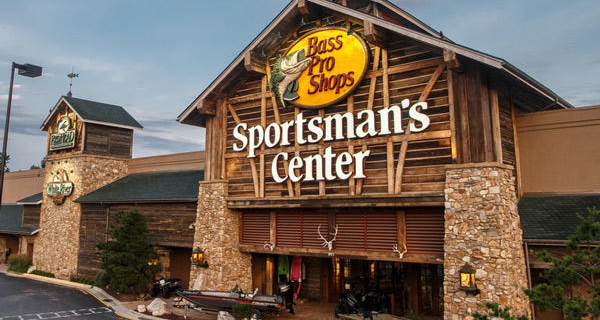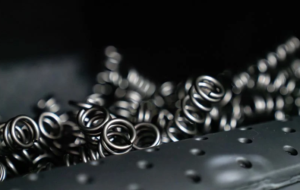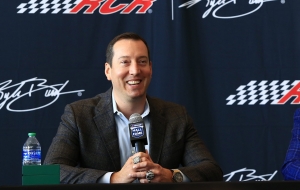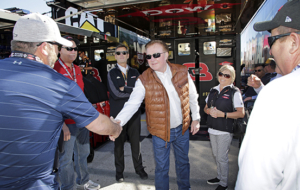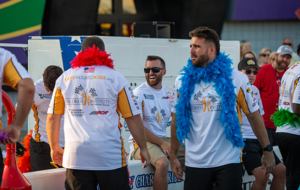As originally reported by Triangle Business News’ Lauren Ohnesorge
North Carolina had help when it came to reeling in Bass Pro Shops’ $34 million boat manufacturing operation – in the form NASCAR’s Richard Childress.
Newly-disclosed records show the racing legend and current NASCAR team owner – who is also a North Carolina native – is the one who actually introduced Gov. Roy Cooper and Johnny Morris, CEO of the outdoor retail giant, getting the ball rolling on a project expected to bring in 500 jobs and also save a legacy brand.
Nearly 1,500 pages of emails, applications and other documentation describe a particularly high stakes project. Code named Project Blue Fin, Bass Pro Shops subsidiary White River Marine Group wasn’t just investing in an operation, it was saving jobs when it announced its plans in May. That’s because the plan also included Bass Pro buying the assets of New Bern-based Hatteras Yachts, which according to documents released through a public records request was in danger of folding altogether.
For Bass Pro Shops, it was good business.
Prior to the project, the firm manufactured its saltwater products in Oklahoma and Arkansas, meaning they had to be shipped to coastal regions.
“By relocating the manufacturing of the saltwater products to a coastal location, we are able to grow that segment of our business while simultaneously expanding the manufacturing for our freshwater products in our existing Oklahoma and Arkansas facilities,” the company stated.
And it pitched its buy of Hatteras as a win-win, telling the state that its acquisition “of a distressed existing boat manufacturer” would allow it to re-hire some of the existing skilled workforce in the region. Hatteras, the firm said, made the state more attractive. The idea of saving an existing boat brand at a facility that once employed more than 500 people was attractive.
If the firm was awarded incentives, it would immediately close on an asset purchase of Hatteras, which wouldn’t include its personnel.
“It is our understanding that but for this purchase existing jobs are in jeopardy and this iconic brand will exit the sport-fishing/yacht industry,” the firm told the state in a project overview.
And that part of the project spoke to local officials as well.
“Hatteras Yachts has been a long-term pillar of Craven County’s economy and the success of your vision to combine Hatteras Yachts with the Mako and Ranger brands here in Craven County will sustain this legacy for future generations of our community,” wrote Jack Veit, Craven County manager, along with the county’s $600,000 grant offer.
But it was by no means a done deal. Missouri-based Bass Pro also identified competing options to acquire facilities in Florida and South Carolina – moves that would also fit its capacity needs.
“Each of these sites are close to our customer base and offer an existing skilled workforce,” it said.
Without a competitive incentives offer from North Carolina, the move in Craven County “would not be economically practical.”
The firm declined to offer specifics about what was being offered by sites in Charleston, South Carolina, and Homestead, Florida, but described them as “similar incentive packages.” And state officials clearly took the competition seriously, as officials at the highest levels entered the discussions early.
Chris Chung, CEO of the Economic Development Partnership of North Carolina, had looped in Commerce Secretary Machelle Sanders on April 6, shortly after Gov. Roy Cooper’s first phone call with Bass Pro CEO Johnny Morris.
Childress, who was born in Winston-Salem, had actually called Cooper initially, offering to make the connection with Morris, Chung noted.
“While this isn’t a ‘mega project’ … it’s high profile enough that I wanted to share with you the details,” he told Sanders, noting that, over the weekend, he had been contacted by Morris and briefed on the firm’s discussions with Hatteras. “The goal would be to produce Mako boats in New Bern, while also investing in a ‘reinvigoration’ of the HY brand.”
But it was also exploring a competing acquisition in Florida.
And decisions were being made quickly.
Days later, Chung reached out to Ken Eudy, senior advisor with the governor’s office, asking that Cooper reach out again to Morris “now that the company is in receipt of the various incentive offers.”
“Johnny’s M.O. has been to move quickly throughout this whole process,” he wrote April 21, urging Cooper to make the fall in the next day.
The project was announced as a win in May.
If it meets its milestones, the firm will receive more than $6 million in state incentives, including more than $600,000 in training incentives from the state’s community college system. Local entities stepped up and added an additional $1.1 million.





